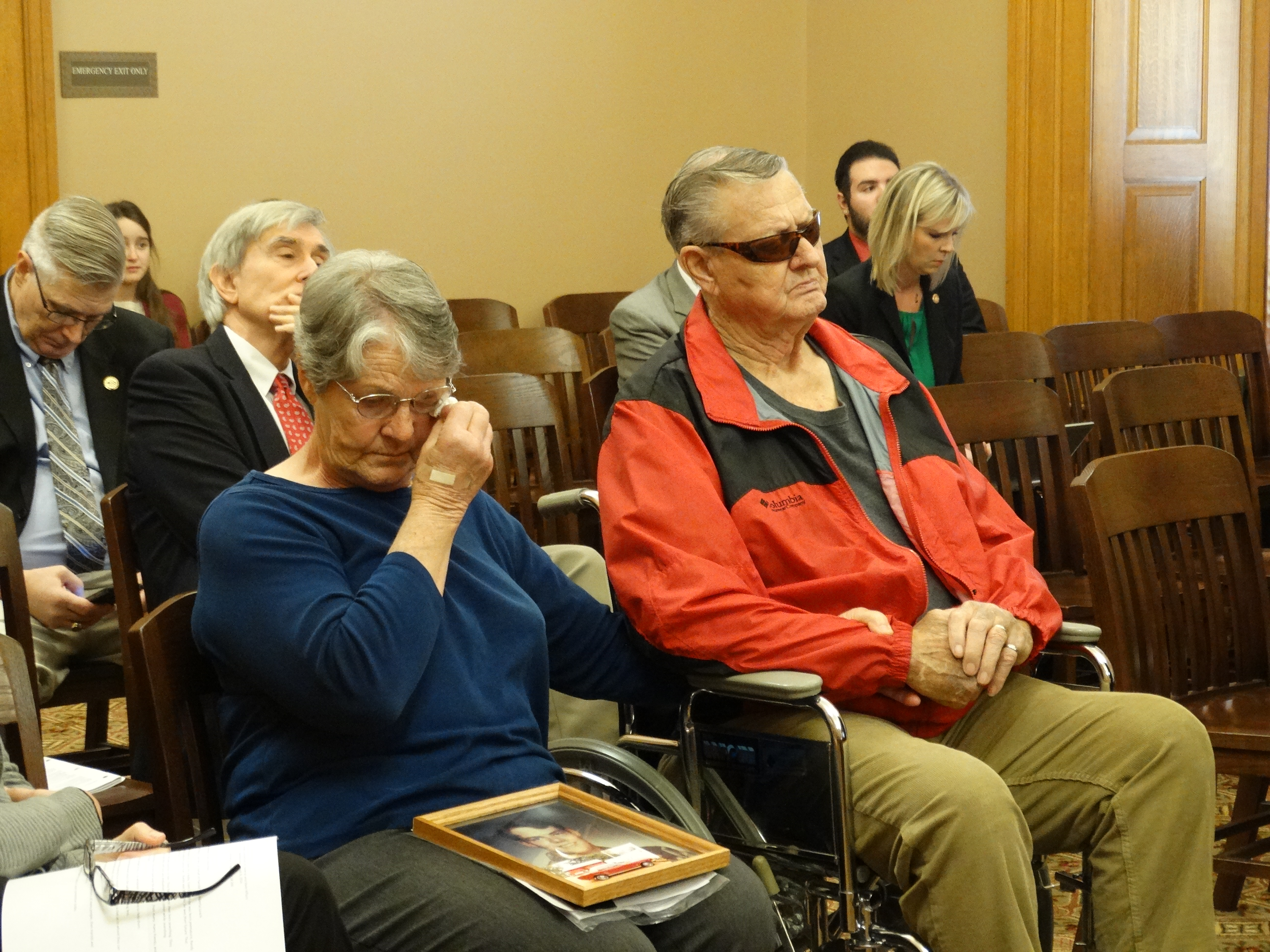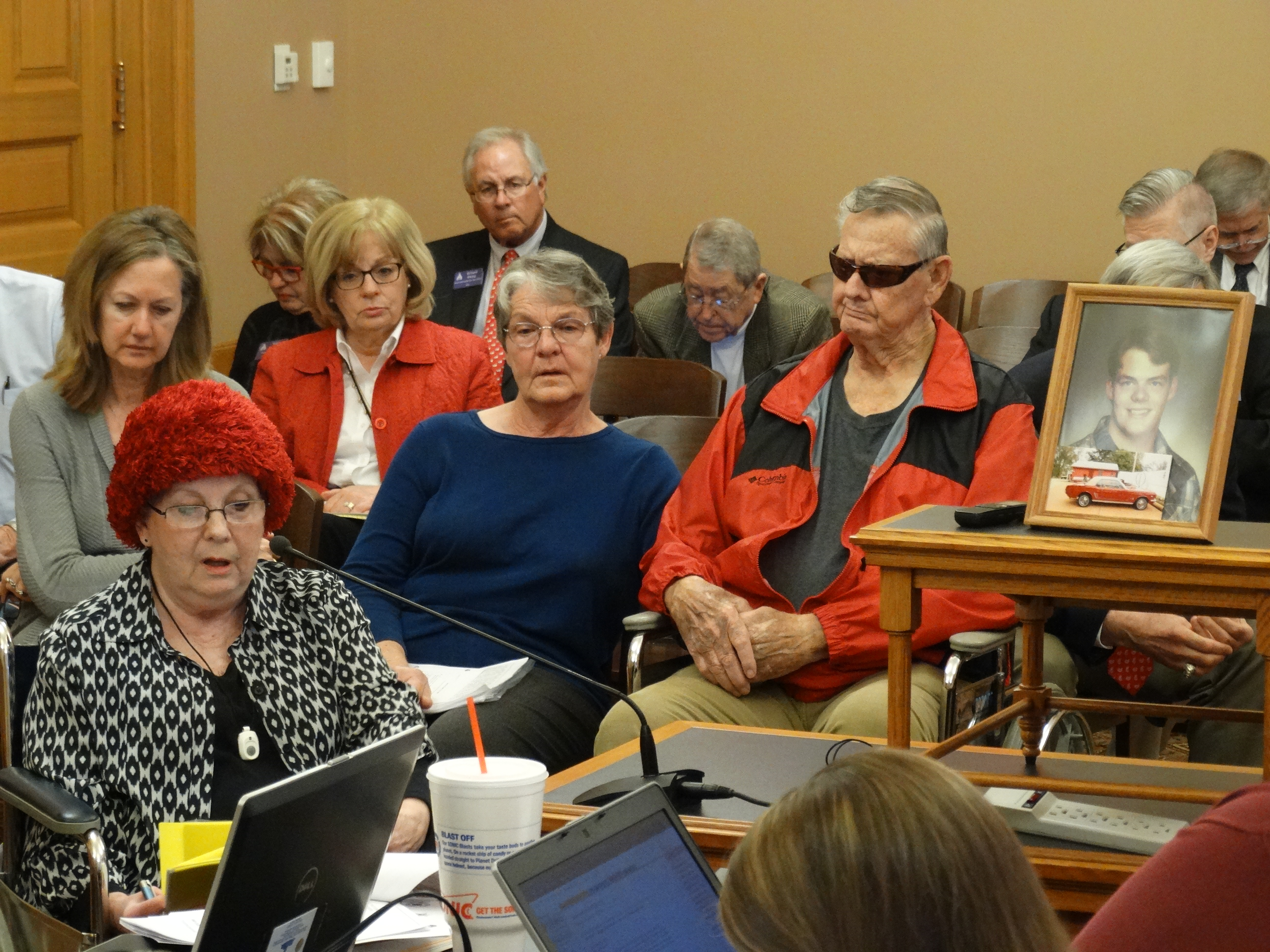Bill advances in Senate to open records in cold-case files; parents of missing teen praise decision

Alberta Leach wipes away tears during a Senate committee hearing Wednesday, sitting next to her husband Harold and holding a portrait of their son Randy, who disappeared from their Linwood home 29 years ago. The committee voted to advance a bill that would unseal some of the investigation records in their son's case.
Topeka ? Harold and Alberta Leach had a rare moment of satisfaction Wednesday when a Senate committee quickly advanced a bill that would unseal some records of the investigation into the disappearance of their son nearly 29 years ago.
“I think it’s a lot faster than we really expected, but hopefully it’ll go through and get us some records,” Alberta Leach said after the vote.
On a Friday evening, April 15, 1988, according to Harold Leach, their only child, 18-year-old Randy, left their house outside of Linwood, got into the family car and headed out for a pre-graduation bonfire party at a friend’s home where about 150 other graduating seniors in his class would be.
He never returned home, and the family car has never been found.

Alberta and Harold Leach of Linwood, center, display a portrait of their son Randy, who has been missing for nearly 29 years, while their friend Vickie Frost reads their testimony in favor of a bill that would unseal some of the investigation into their son's disappearance. A Senate committee acted quickly to advance the bill to the full Senate.
For years, his parents have questioned whether the Leavenworth County Sheriff’s Office and the Kansas Bureau of Investigation conducted a thorough investigation or followed through on leads.
But their search for answers has been stymied, they have said, because records of criminal investigations are generally exempt from the Kansas Open Records Act, no matter how old the records are or how long the case has been cold. The only way to unseal the records is to obtain a court order after convincing a judge that unsealing the records would be in the public interest, a process that can be expensive.
The Leaches sat quietly during the committee hearing, with their son’s senior portrait placed on the podium, as a family friend, Vickie Frost, read Harold Leach’s written testimony aloud to the committee.
“It was the worst day of our lives, but it only gets worse because his case, to this very day, has never been solved,” she said, reading from the text. “So every minute of every day, day after day, and year after year, we relive the worst day of our lives, over and over, for 29 years now, with no end.”
Then, speaking on her own behalf, Frost said that in 1990, two years after Randy Leach’s disappearance, the family submitted a petition with more than 12,000 signatures asking for a formal inquisition into the case, a process that allows a sheriff or prosecutor to subpoena witnesses and compel testimony as part of an investigation. But she said state and local law enforcement agencies denied their request.
Senate Bill 200 would amend the Kansas Open Records Act by requiring law enforcement agencies to grant public access to records in missing person investigations if the person has been missing for 25 years or more. It would apply only to records in those cases that are at least 15 years old.
The bill was introduced at the request of Sen. Tom Holland, D-Baldwin City, whose district includes Linwood and much of Leavenworth County. He said the bill was written to carve out a narrow exception to the rule that otherwise closes public access to criminal investigation records. He also offered amendments, which the committee adopted, to allow agencies to redact information that might identify confidential informants or undercover investigators.
The Kansas Press Association also testified in favor of the bill. But the KBI, the Leavenworth County Sheriff’s Office and a lobbyist for three law enforcement associations submitted written testimony opposing the bill.
“These reports are often a collection of unsubstantiated information and or conjecture,” Leavenworth County Sheriff Andrew Dedeke said in his written testimony. “The persons who provide this information are often acting on a belief they are aiding in the investigation, but with the passage of time they may be reluctant or even embarrassed by the accusation made long ago.”
“We also must be cognizant that these reports contain information which now may prove to be detrimental to other named persons and subject them to ridicule or further question,” his testimony continued. “These types of personal damages may lead to liable and slander suits, unwarranted character denigration and other related hardships.”
Members of the Senate Federal and State Affairs Committee, however, said they sympathized with the Leach family, and they said law enforcement officials have had enough time to investigate the case.
“To give you some context, I was a senior in high school in 1988, and today I’m a grandfather,” said Sen. Ty Masterson, R-Andover.
Typically, legislative committees do not vote on bills the same day in which they hear testimony. But the Senate Federal and State Affairs Committee made a rare exception Wednesday and voted to advance SB 200 favorably to the full Senate, with some additional amendments.
Sen. Rob Olson, R-Olathe, suggested changes to require the records to be produced within 30 days of the request and at no charge to close family members of the victim.
The committee also discussed, but did not act on, a possible amendment to clarify whether the bill applies only to missing-person cases or to all criminal investigations.
Chairman Jacob LaTurner, R-Pittsburg, said he would consult with legal advisers before deciding whether to offer that amendment when the bill comes up for debate on the floor of the Senate.
Senate leaders will announce later when that debate will occur.






